David Glen
(1850-1916)
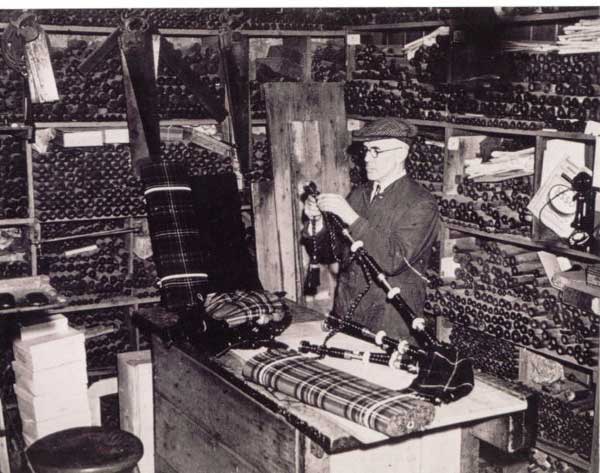
Very few individuals who weren’t prizewinning competitive players have influenced the idiom as profoundly as David Glen. Born into the leading pipemaking dynasty of the time, he would not only take over the business and lead it during its greatest years, he would become one of the most impassioned, progressive and prolific editors and compilers of bagpipe music ever, a virtual giant of pipe music publishing.
He was born in Edinburgh on April 3, 1853 to Alexander Glen (1801-1873), the thirteenth child of his father’s second marriage. Alexander was making pipes as early as 1835, though his brother Thomas MacBean Glen had already established a firm that would eventually become J&R Glen by 1833. Alexander made the prize pipes for the Northern Meeting from 1865-1869. Though there were apparently strong connections between Thomas Glen and Donald MacDonald, it is not clear how much influence MacDonald’s pipemaking had on the Glen brothers.
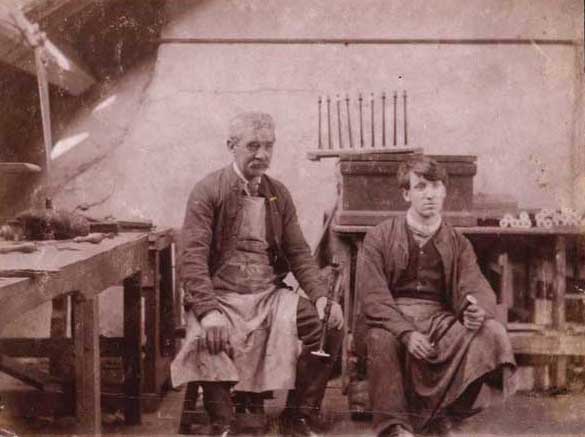
David joined Alex’s business in 1869 and took over at the age of 19 when his father died in 1873. He married in 1876 and had five sons. He would rename the business David Glen & Sons in 1912.
Though his father was not a piper, David was taught pipes by Gilbert Gordon, piper to Lord Panmure and a Perth innkeeper, and he became a very capable player. Glen pipes were the staple instrument for many of the top professionals for many years on either side of 1900. They were made mostly in cocuswood and ebony and known for their rich, steady, but subdued tone. Glen’s pipes had a distinctive look, with the lower bead on the projecting mount cut flat on the top in what is often called a ‘parrot’s beak’ style. Vintage David Glen pipes are still common today.
Despite his massive output of pipes, it is as a musicographer that David Glen will be best remembered.
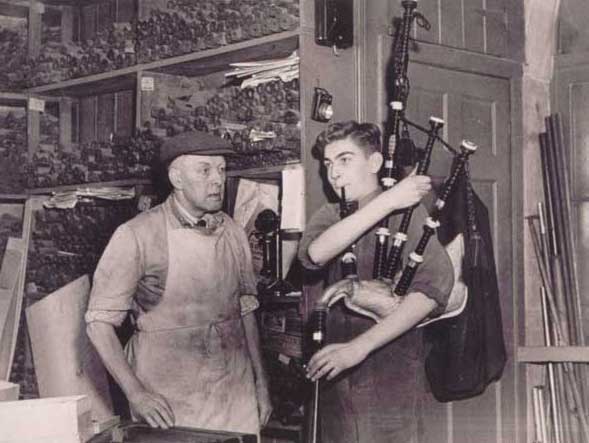
David Glen’s Collection of Highland Bagpipe Music appeared in 17 parts between 1876 and 1900 and contained nearly 1,100 pieces of light music, both old and new. The books – small horizontal volumes that fit neatly into a pipe case – were carefully notated, meticulously typeset and beautifully produced. Clearly, Glen’s position as a pipemaker in Edinburgh afforded him acquaintance with scores if not hundreds of pipers and the tunes they played or composed. His work raised the publishing of pipe music to a new level. His books, particularly his light music collections, would be in common usage for nearly 100 years. To this day it is not unusual to find a long-unplayed set of pipes under a grandfather’s bed with a dog-eared Glen book or two in the bottom of the case.
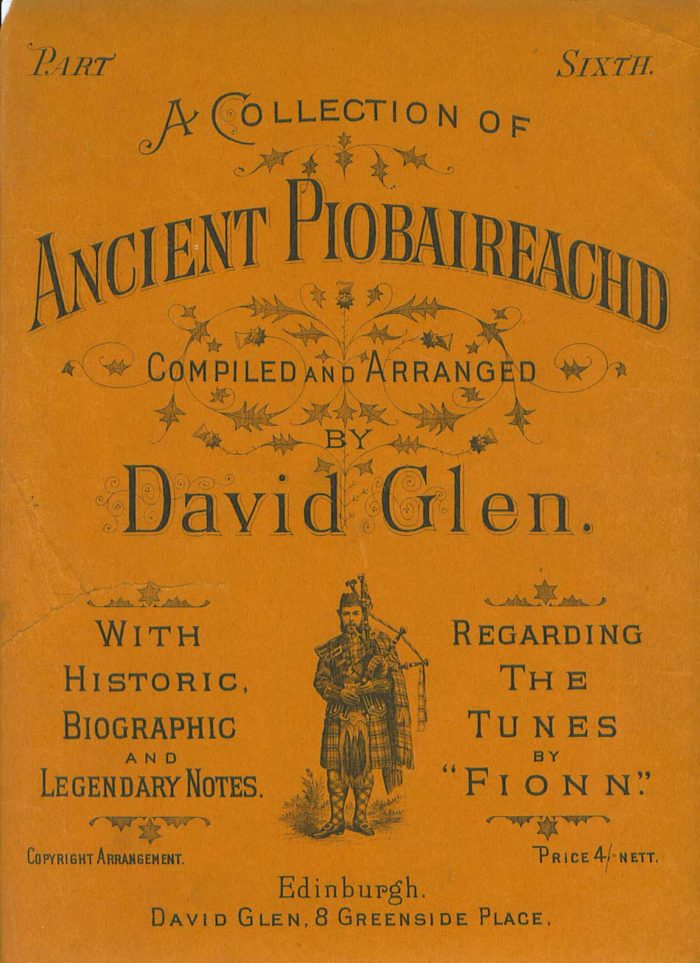
His Collection of Ancient Piobaireachd or Highland Bagpipe Music appeared in seven parts between 1880 and 1907. This was a very significant and timely collection of 100 tunes that could be purchased as individual books, a bound collection, and even as separate pieces of sheet music. At the same time, he was compiling a manuscript collection of 190 tunes that was influenced by the leading players of the day – Charles Bannatyne (1867-1924), John McLennan (1843-1923), General C.S. Thomason (1833-1911) and particularly Colin Cameron (1843-1916) and John MacDougall Gillies (1855-1925). Not content to be a mere scribe, Glen’s piobaireachd publications are notable for additions and emendations to tunes – particularly the addition of variations – that he made and carefully documented throughout his work.
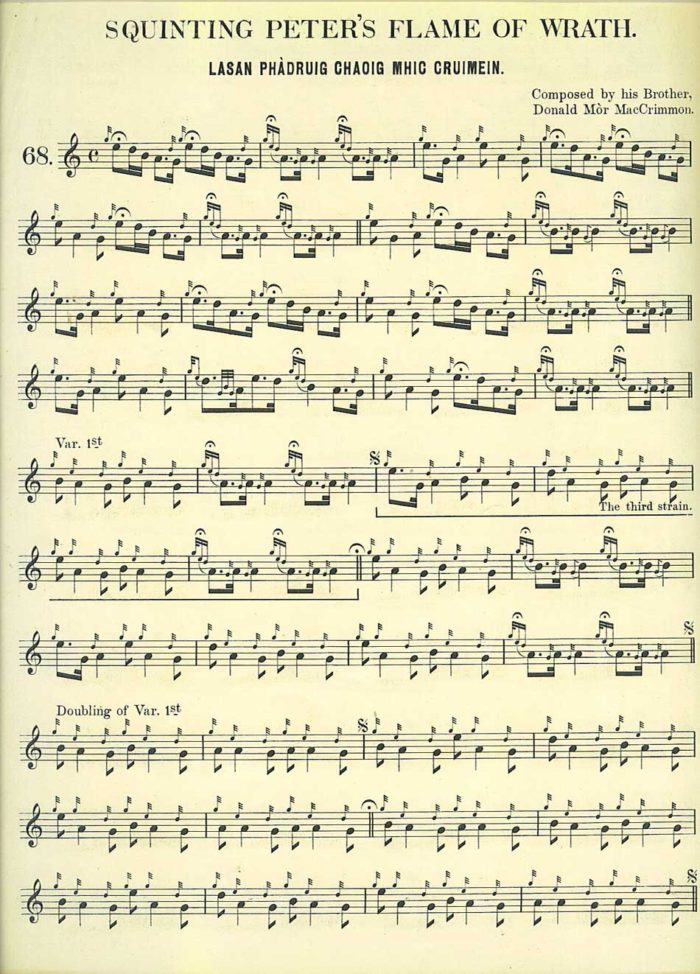
Though Ancient Piobaireachd retained the respect of leading performers such as John MacDonald of Inverness, who called it “the most reliable we have today,” their significance was eclipsed by the publication of the Piobaireachd Society Collection beginning in 1905. With this group’s consolidation of power over competitions and teaching, Glen’s piobaireachd books did not enjoy the longevity of his light music collections.
In 1905, Glen would publish The Music of the Clan MacLean, that included 12 piobaireachds and some light music. Finally, between 1903 and 1908, he published The Edinburgh Collection of Highland Bagpipe Music, Pibrochs, Marches, Quicksteps, Strathspeys, Reels & Jigs in 11 parts with more than 500 tunes.
David Glen died of a stroke on June 25, 1916 at the age of 64. His sons Alexander (Sandy, 1877-1951) and David (1883-1958) took over the business, which survived until 1978.
His manuscript is published on pipetunes.
JM, January 2008
-with notes from ‘The Highland Pipe and Scottish Society 1750-1950’ (2000) and ‘Pipers’ (2005) by Dr. William Donaldson, Dr. Donaldson’s entry on David Glen in the Oxford Dictionary of National Biography, ‘Highland Bagpipe Makers’ (2001) by Jeannie Campbell, The Bagpipe Place website by Ron Bowen, the Piping Times, February 1969, August, 1969 and July 1998.

9 Comments
Hi I have a David Glenn bagpipes and I know it’s very very old as my uncle was 87 and it was his fathers so I’m wondering if o could be given a valuation I know it’s got ivory and silver around the bagpipes
Kind Regards
Colleen
Hi Colleen: I did email a reply to the photos you sent. Did you receive it? JM
I have a lovely kilt with the label J. & R. Glen Only Address 497 Lawnmarket, Edinburgh. The kilt is very heavy and is in good condition. Could you give me some idea of its age. I could send a photo if you were able to help.
I wouldn’t know the age of the kilt from looking at it, but J&R Glen operated in Edinburgh up until 1978, so it conceivably may not be all that old. JM
I have almost a complete set of the David Glen pipe music books that my Grandfather had. Also 2 of the Piobaireachd ones.
They are in reasonable condition, with the odd page missing.
What value have they seeing they must be 100 years old?
Not a great deal of monetary value, actually. The Glen books were widely printed, so there are still lots of them around. Plus they are available in pdf format online. JM
Hello, can anyone help give me some information on J. Mauchline who wrote a few of the tunes in the David Glen’s Collection?
Hola poseo gaitas a nombre de DAVID GLEN Y J&R GLEN EDINBUGH…serían Team amables de informarme acerca de ellas y posible valuación…y como les hago llegar fotos de las mismas. Gracias
I’m afraid I can’t translate this!